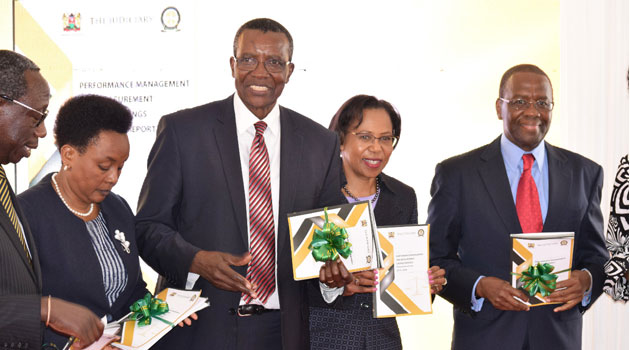
In August 2018, Chief Justice David Maraga had recommended the allocation of minimum 1.5 per cent of the national budget to the Judiciary to facilitate its operations/CFM NEWS
NAIROBI, Kenya, May 17 – The Judiciary has appealed for enhanced funding to seal an increasing staffing gap and expedite the hearing and conclusion of cases.
Chief Registrar Anne Amadi said during the launch of the 2017/18 Performance Management and Measurement Understandings Evaluation (PMMUE) report on Friday the current combined judges and magistrates population of 674 was insufficient given the over 500,000 cases pending in various courts.
“With the current number of pending cases, on average each judicial officer has 821 cases to deal with if the matters were to be equally shared out. In a year with 365 days when we take out weekends, public holidays and leave, we’re left with about 230 working days to hear and determine 821 cases per judicial officer,” she said.
Amadi observed it would take the judicial officers four years to clear 533,187 cases pending in various courts, a situation that is untenable with the projected increase in the number of new cases being filed.
“Our judges to population ratio needs to expand exponentially even as we review our work methods and accelerate automation. This requires resources,” she said.
Amadi proposed a minimum quota of 2.5 per cent of the national budget to fund the operations of the judiciary, a revised appeal compared to last year request.
In August 2018, Chief Justice David Maraga had recommended the allocation of minimum 1.5 per cent of the national budget to the Judiciary to facilitate its operations.
The CJ had called for the progressive enhancement of the quota to 2.5 per cent to attain a globally recommended threshold.
In her statement on Friday, Amadi noted that funds allocated for the Judiciary had over the years decreased with corresponding national budget increment.
“There has been a corresponding decrease in the Judiciary budget with every increase in the national budget. In this current Financial Year where the national budget stands at Sh3 trillion our budget is at Sh12.9 billion which stands at 0.43 per cent,” she said.
“When we make proposals of a guarantee of a minimum of 2.5 per cent of the national budget for the Judiciary it is not just an idle musing – it is a carefully thought out proposal intended to build and strengthen an important arm of government,” she added.
The Judiciary reported key milestones in the 2017/18 review period, the PMMUE report launched by Maraga showing an improved trial and delivery certainty index.
Maraga however urged judicial officers to sustain ongoing reforms geared towards eliminated case backlogs dating five years and above.
“One of the agreed targets to be achieved is trial and delivery date certainty. This indicator measures the certainty with which, mentions, hearings, and delivery of judgments are held and scheduled,” he noted.
Maraga said although considerable progress had been made during the year under review, more work needed to be done to boost public trust in the Judiciary.
“I urge all judges to strive for a higher score as this remains a high concern for litigants and others who wait for inordinately long for conclusion of their matters,” the CJ urged.
He said 154,184 of 170,186 cases that had been pending for more than five years in 2017 were cleared by March 2018, a 91 per cent clearance rate.
During the launch of the report, a number of judicial agencies and court stations were recognized as best performers in various categories including backlog clearance.
The Nairobi Court of Appeal Civil Division under Justice Philip Waki was rated top performer followed by the Court of Appeal in Malindi.
Nairobi’s Criminal Division and Kisumu followed, with Kisumu scoring the highest on clearance of civil cases.
The Milimani Magistrate’s Children’s Court was ranked topped in its category followed by the Tononoka Court.
The Office of the Ombudsman under the leadership of Deputy Chief Justice Philomena Mwilu was named the best performing semi-autonomous judicial agency.
Supreme Court Registry was rated top in its category.











































